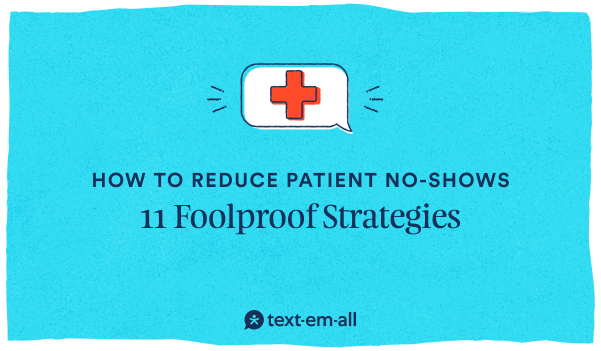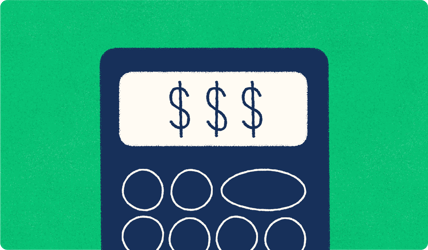
Missed appointments don’t just disrupt schedules—they impact patient care and cost healthcare providers time and revenue. Patient no-shows are a common challenge, but the good news is they’re not inevitable.
With the right strategies in place, clinics and practices can significantly reduce no-shows while improving the overall patient experience. From using automation technology to fostering stronger communication, small adjustments can lead to big results. In this guide, we show you how to reduce patient no-shows through actionable, proven methods that keep your schedule full and your patients engaged.
The hidden cost of patient no-shows
Patient no-shows result in significant financial and operational inefficiencies that also open the room for negative impacts on patient care:
- Financial loss: Missed appointments directly translate to lost revenue. For large healthcare systems, this can mean millions of dollars annually. Overhead costs like staff salaries, utilities, and medical supplies persist regardless of attendance.
- Operational disruptions: Empty slots disrupt the workflow for physicians, nurses, and administrative staff. Last-minute gaps in schedules often go unfilled, leaving teams underutilized. Over time, these inefficiencies erode productivity and morale.
- Impact on patient care: Missed appointments delay treatment, extend wait times for others, and can worsen health outcomes. This is particularly concerning for patients requiring timely diagnostics or ongoing management of chronic conditions.
Why do patients miss appointments?
To reduce no-shows, it’s important to understand the factors behind them. Common reasons include:
- Forgetfulness: Patients often miss appointments simply because they forget. Busy schedules, work, and family commitments make remembering medical visits a challenge.
- Transportation barriers: Limited access to reliable transportation—particularly in rural or underserved areas—prevents many patients from reaching healthcare facilities.
- Scheduling conflicts: Patients juggling work, childcare, or caregiving responsibilities may struggle to attend appointments during traditional office hours.
- Anxiety and fear: Fear of medical procedures or results can lead patients to avoid appointments. Empathetic communication can help address these fears.
- Health literacy: A lack of understanding about the importance of regular medical care can result in missed appointments. Education initiatives can mitigate this.
- Financial concerns: Concerns about co-pays, transportation costs, or other out-of-pocket expenses may deter attendance, particularly in economically vulnerable populations.
- Communication challenges: Patients often miss appointments because of unclear communication. Reasons often include inefficient communication methods and missing important details about their appointments.
Why SMS is the ultimate solution for reducing no-shows
SMS offers a unique combination of accessibility, immediacy, and effectiveness, making it the ideal tool for reducing no-shows in healthcare. Here’s why:
- Ubiquity: SMS works across all patient demographics, regardless of tech-savviness. Unlike apps or email, it doesn’t require a smartphone or internet access, making it universally accessible.
- High engagement: With a 98% open rate compared to just 36.5% for emails, text messages are far more likely to be seen and acted upon by patients.
- Instant communication: SMS delivers real-time notifications, ensuring time-sensitive reminders are received and read quickly—whether it’s a same-day follow-up or a last-minute scheduling change.
By integrating SMS into your communication strategy, you can tackle the root causes of no-shows and provide a smoother, more reliable experience for patients.
Read more: Texting Patients: The New Era of Healthcare Interaction
11 strategies to reduce patient no-shows
A patient-centered, multi-channel communication strategy is critical. Here are effective ways to minimize no-shows:
Use automated reminders
Make sure to send multiple reminders leading up to the appointment. Automated text messages, emails, or even phone calls work wonders, but as mentioned before, text reminders have the highest success rate. Examples include:
- SMS: “Hi [Patient’s Name], this is [Clinic Name]. Your appointment is on [Date] at [Time]. Reply ‘CONFIRM’ or call us to reschedule.”
- Email: Include appointment details and a clickable link to confirm, reschedule, or cancel.
- Call: Automated or live calls for patients who prefer verbal reminders.
Include all the necessary details in your reminders—time, date, location, and anything the patient needs to bring or prepare for their appointment. Last, if a patient responds to a reminder saying they can’t attend, immediately offer the option to reschedule via automated systems.
Read more: Best Texting Practices for Healthcare Appointment Reminders
Get confirmation
Asking patients to confirm their appointments gives you the opportunity to double-check that they’ll be attending. A quick confirmation can save you from last-minute no-shows.
Interactive confirmation: Send a simple confirmation request via text, where patients can easily reply or click a link to confirm their appointment.
Multiple confirmation methods: Provide patients with different ways to confirm so they can choose the option that’s most convenient for them.
Allow flexible scheduling
Life happens, and sometimes patients just can’t make it to a scheduled appointment. Offering more flexibility in scheduling can reduce the likelihood of no-shows.
- Extended hours: If possible, offer evening or weekend appointments to accommodate patients who work during traditional office hours.
- Telehealth options: Consider offering virtual consultations for follow-up visits or minor check-ups. This allows patients who can’t make it to the office to still keep their appointments.
"Hi [Patient's Name], we offer flexible appointment times, including evenings and weekends. Reply 'FLEX' to explore options. Let's find a time that works for you! - [Clinic Name]"
Offer transportation assistance
Transportation issues are a common barrier to keeping medical appointments, especially for patients without reliable access to transportation. By offering support, you can help eliminate this hurdle and reduce patient no-shows.
- Partnerships with rideshare services: Partner with rideshare companies like Uber or Lyft to offer discounted or free rides for patients in need. Some healthcare providers have successfully incorporated this into their services to ensure patients make it to their appointments.
- Shuttle services: For patients in local areas, offering a shuttle service to and from your office can help reduce transportation barriers, especially for elderly or low-income patients.
- Referral to public transit: If your office is near public transportation hubs, provide detailed directions and schedules or even offer vouchers for bus or train rides to make the journey more affordable.
"Hi [Patient's Name], if you need help with transport to our clinic, we can assist. Reply 'TRANSPORT' to discuss your needs. Your health is our priority. - [Clinic Name]"
Educate patients
Sometimes, patients miss appointments because they don’t fully understand the importance of regular visits or the potential consequences of missing them. Educating them can motivate them to prioritize their healthcare.
- Informational campaigns: Regularly share educational content, like brochures or videos, explaining the value of regular checkups and how it benefits long-term health. Use your website, social media, or waiting room screens to get the message across.
- Provider-patient conversations: During appointments, take the time to explain why follow-up appointments or consistent care are essential. When patients understand the "why," they may be more likely to show up for the "how."
- Health tips: Send reminders that include health tips along with the appointment details.
"Did you know regular check-ups can help prevent heart disease? We look forward to seeing you!"
Incentivize attendance
Who doesn’t love a little reward? By offering incentives, you can encourage patients to show up for their appointments.
- Loyalty programs: Consider offering a loyalty program where patients earn points for attending appointments, which can be redeemed for discounts or small perks like free consultations or priority booking.
- Discounts for on-time arrival: A small discount for those who show up on time could go a long way in promoting punctuality.
Have a clear cancellation policy
Make sure your patients know that missed appointments are a big deal—both for you and them. A clear, fair cancellation policy is key to reducing no-shows.
- Charge for no-shows: Implementing a nominal fee for missed appointments can help patients understand the importance of canceling in advance.
- Communicate your policy: Be transparent about your cancellation policy from the get-go, whether when the appointment is made or in reminder messages, so there are no surprises.
Follow-up after a no-show
After a patient misses an appointment, sending a follow-up message can help you understand the reasons behind it and increase the chances of rescheduling and maintaining patient trust.
Make the message friendly and understanding without sounding accusatory. For example:
"Hi [Patient's Name], we missed you at your appointment. Is everything okay? Please call [Phone Number] or reply to reschedule. Your health is our priority. - [Clinic Name]"
For frequent no-show patients, have a staff member follow up personally. A call from a receptionist or office manager can go a long way in showing that you care about their well-being.
Provide pre-paid appointments
Pre-paying for appointments can be a strong incentive for patients to show up, as it’s an upfront financial commitment. It also helps reduce missed visits due to financial concerns or forgetfulness.
Pre-paid packages: Offer patients the option to purchase pre-paid packages for a series of appointments (e.g., a year's worth of check-ups, follow-ups, or dental cleanings). This encourages regular attendance and ensures that patients are more likely to show up for their next appointment.
Discounts for pre-payment: Provide a discount for patients who pay upfront for their appointments. This not only helps with attendance but also encourages early commitment.
Non-refundable fees: For higher-demand services, a non-refundable booking fee can be charged at the time of scheduling. This motivates patients to avoid last-minute cancellations or no-shows, as they’ve already financially committed to the service.
"Hi [Patient's Name], we offer prepaid appointments for easy check-in. Reply 'PRE-PAID' to learn more and make your visit stress-free. - [Clinic Name]"
Target high-risk patients
Use your data to identify patients who may be more prone to missing appointments. Proactive outreach can help reduce the chances of no-shows.
Review patient records to identify those who have missed appointments in the past. Reach out to them before their next visit with extra reminders and check-ins. Also, consider sending a more personalized message, offering support for any barriers to attendance they might be facing.
Centralize your communication
When you have multiple locations, it's essential to have a unified communication system. This ensures that no matter where a patient is, they receive consistent messaging, reminders, and support.
Use a central scheduling software that integrates all your locations so appointments can be managed from one platform. This ensures that when patients call or book online, they receive consistent reminders and updates, regardless of which location they're attending.
Additionally, implement standardized messaging templates for appointment reminders, follow-up communications, and cancellations. Whether the patient is seeing a provider in one location or another, the messages should be consistent in tone, content, and format.
Slash patient no-show rates with Text-Em-All
Healthcare providers can significantly boost efficiency and enhance patient care by implementing smart strategies to reduce no-shows. Platforms like Text-Em-All offer HIPAA-compliant mass texting and automated calling, which are powerful tools for timely reminders and follow-ups, ensuring patients never miss appointments.
By combining the strategies outlined above, you can create a patient-centered approach that benefits both patients and your organization.
Don’t wait—take the first step today and sign up for a free account, and watch your operations transform for the better.













.png?width=826&height=269&name=cta-healthcare-guide%20(2).png)